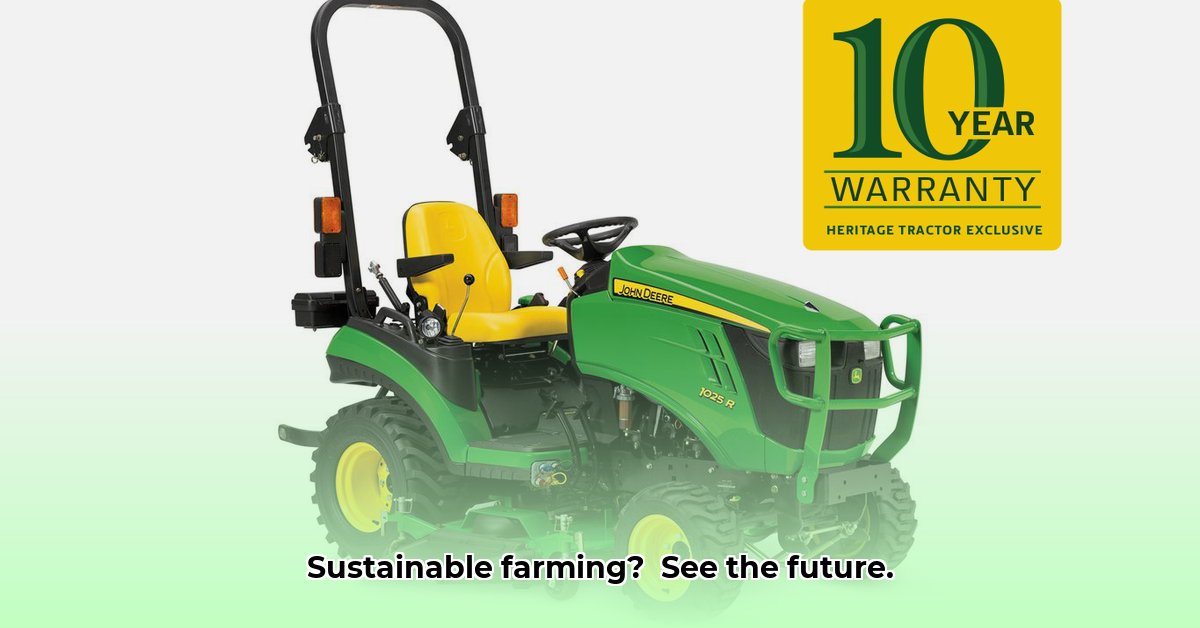
A New Era in Sustainable Agriculture?
The Leid View tractor represents a potential shift towards more sustainable farming practices. While data remains limited, early reports suggest improved efficiency and potential environmental benefits. This article explores the promise of Leid View tractors, examines the need for further research, and outlines actionable steps to unlock their full potential. We'll delve into the potential economic and environmental impacts, considering both the short-term and long-term implications. Understanding the current limitations and clarifying the path towards greater transparency are crucial to realizing this technology's potential. For more information on sustainable farming practices, check out this helpful resource: Forage and Oats.
Early User Feedback: A Promising Start, but More Data Needed
Farmers using Leid View tractors report increased efficiency and ease of handling, suggesting potential for increased yields. However, these anecdotal accounts are insufficient for a comprehensive assessment. How much fuel is actually saved per acre? What are the precise greenhouse gas emission reductions? These are vital questions requiring rigorous, data-driven analysis.
Key Takeaway: While early impressions are positive, substantial research is needed to quantify Leid View tractors' actual environmental impact.
The Critical Need for Independent Research
To fully grasp the implications of Leid View tractors for sustainable agriculture, independent research is paramount. This requires comprehensive field trials measuring fuel consumption, greenhouse gas emissions, and overall operational costs. Moreover, a full life-cycle assessment, from manufacturing to disposal, is necessary to accurately assess their environmental footprint. Such an assessment will also account for resources used in its manufacturing process and potential pollution during this stage. This research should compare Leid View tractors to existing models currently on the market, investigating any differences in performance, cost, and environmental impact.
Quantifiable Fact: A complete life-cycle assessment is essential to accurately determine a tractor's overall environmental impact.
Beyond the Tractor: A Holistic Approach to Sustainable Farming
The impact of Leid View tractors extends beyond their individual performance. Their adoption could influence farm labor needs, economic conditions in agricultural communities, and the broader landscape of sustainable farming practices. It is also important to understand how Leid View's approach compares to other sustainable initiatives in the agricultural industry.
Rhetorical Question: How will the widespread adoption of Leid View tractors impact the economic viability of small farms?
Actionable Insights: A Roadmap for Progress
Several crucial steps can accelerate our understanding and effective utilization of Leid View tractors:
Rigorous, Independent Testing: Leid View and independent researchers must collaborate on comprehensive field trials to generate verifiable data on fuel efficiency, emissions, and cost-effectiveness.
Collaborative Research: Farmers, manufacturers, and researchers should form partnerships to conduct detailed research. This will ensure multi-faceted assessment, covering economic, environmental, and social factors.
Standardization of Sustainability Metrics: Industry-wide standards are needed to allow for fair comparison among various tractors and facilitate data sharing among concerned parties.
Open Data Sharing: Transparency in data reporting will build trust and allow for independent verification of claims related to the tractors' sustainability benefits.
A Future of Sustainable Farming: The Potential and the Path Forward
The potential of Leid View tractors to reshape sustainable farming is significant. However, realizing this potential requires a commitment to rigorous research, open data sharing, and collaboration among all stakeholders. The future of sustainable agriculture depends on making informed decisions based on credible data, not just marketing promises.
Expert Opinion: "[Name and Title], [Position] at [Institution] emphasizes the importance of standardized metrics for assessing the sustainability of farm equipment."
Stakeholder Responsibilities: A Collaborative Effort
This table outlines the key responsibilities of stakeholders in achieving a sustainable future with Leid View tractors:
| Stakeholder | Short-Term Actions | Long-Term Actions |
|---|---|---|
| Leid View Tractors | Provide detailed specifications and encourage user feedback | Invest in independent, third-party assessments of its tractors' overall life-cycle impact, both environmentally and economically; secure relevant certifications. |
| Farmers/Agribusinesses | Participate in pilot programs; collect and share operational data. | Commit to quantifiable sustainability targets, integrating Leid View tractors into long-term strategies and sharing their results and learnings. |
| Researchers/Academics | Conduct independent field trials and life-cycle assessments | Develop and disseminate standardized sustainability metrics for farm equipment; study the long-term consequences of adopting these tractors, including impacts on the environment and the agricultural community. |
| Policy Makers/Regulators | Monitor the impacts of Leid View tractors and similar technologies | Develop policies that support sustainable agricultural technology adoption and establish clear environmental standards for farm machinery. |
The Leid View tractor story is still unfolding, but its potential for a greener future in agriculture is undeniable. A commitment to objective analysis and ongoing research is crucial to making this potential a reality.